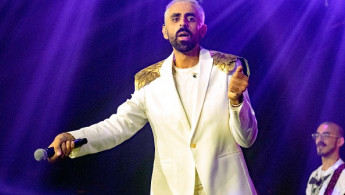Iceland considers Eurovision boycott over Israel's participation
Iceland has separated itself from any affiliation to the region-wide Eurovision competition by severing ties with Iceland's national song contest Söngvakeppnin, according to Icelandic public-service broadcasting organization RÚV on Tuesday.
Iceland’s decision is reportedly due to its condemnation of Israel’s participation as it continues to relentlessly bomb Gaza in its fourth month into the war, which has killed over 26,000 people.
Stefán Eiríksson, RÚV’s director-general, reported that contestants who were competing to represent Iceland were concerned over the ongoing conflict in Gaza, which they alerted the European Broadcasting Union (EBU) about.
"They [the contestants] apply with the goal of becoming Iceland's contribution to Eurovision,” Eiríksson was quoted as saying.
“They share concerns about the state of affairs just like we do. This has been our preparation for Eurovision, and we've announced our intention to participate without any changes. However, we do not know what the future holds."
RÚV added the final decision for whether Iceland will back out of the televised song contest will be made by the winner of the Söngvakeppnin in mid-March, once a victor is announced.
The Icelandic broadcaster also noted that Eiríksson and song contest manager Rúnar Freyr Gíslason said that demands to boycott Eurovision have intensified in other Nordic countries, as a result of Israel’s participation.
Reportedly joining Iceland, Norway and Finland have also considered boycotting Eurovision.
Iceland already wants to boycott the Eurovision music contest. I hope countries will boycott the Olympics in France this year as the french government is on the side of Israel. https://t.co/wxzyqfhk3v
— Veronique Perrot #FreeAssange (@servalan79) January 26, 2024
As discussions continue to take place on Iceland’s participation, Palestinian singer Bashar Murad is vying for the winning spot to potentially represent the nation.
The 30-year-old East Jerusalem-born singer has been officially named as a contender in the preliminary stage of Iceland's Eurovision Song Contest selection.
Murad will be competing with nine other artists during the semi-finals of Söngvakeppnin 2024 with the song Vestrio Villt (Wild West) this March.
The pop artist previously collaborated with Iceland's then Eurovision representatives in 2019, Hatari, when they showed their fierce opposition to Israeli occupation- when the contest was held in Israel.
Murad and Hatari performed the song Klefi/Samed, whose music video was filmed in the occupied West Bank city of Jericho as the group later finished 10th place in the final.
Following his performance with Hatari, Murad told Israeli news publication Haaretz, "Music can't be just music. You can't tell me that Eurovision happening in Tel Aviv is not political."
"I knew that they were going to show people dancing and having fun, that they're going to put the 'postcards' in different cities in Israel, and some of them were occupied territories like the Golan Heights."
His collaborator Hatari also continued speaking out for Palestine, which prompted a warning from Jon Ola Sand, EBU’s executive supervisor to prevent breaching EBU regulations for using the highly publicised stage as a “political statement”.
Hatari members went forth to display banners of the Palestinian flag during the announcement of Iceland's televote score- resulting in a fine imposed by the European media watchdog.
Since the start of Israeli attacks in the besieged Gaza Strip, Murad has continually updated his social media followers on the latest developments in the territory.
He also released a cover of the celebrated song Mawtini (My Homeland)- which is widely regarded as the Palestinian national anthem.
"We've been singing this same song – our grandparents, our parents, and now my generation and the one after mine – for 75 years, and we still haven't gotten our freedom," Murad said in an interview with LGBTQ+ news site Them.
"Zionists live in this strange fantasy land where they think they can scare us [Palestinians] into hiding our identities. They think that just because we live in Jerusalem, under occupation, we identify as Israelis. It's a ridiculous delusion that continues to make the situation worse – this denial of our existence."





 Follow the Middle East's top stories in English at The New Arab on Google News
Follow the Middle East's top stories in English at The New Arab on Google News


